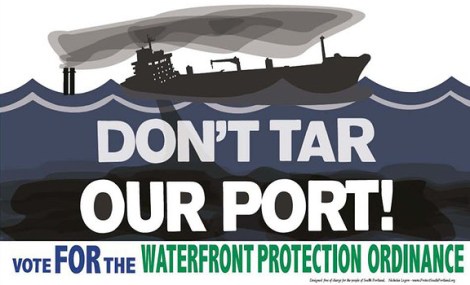 Voters in South Portland, Maine, split like a tar-sands pipeline on Tuesday over whether to allow tar-sands oil to be funneled through their city and loaded onto ships.
Voters in South Portland, Maine, split like a tar-sands pipeline on Tuesday over whether to allow tar-sands oil to be funneled through their city and loaded onto ships.
But it appears that a ballot initiative that would have prevented dockworkers from handling the Canadian crude failed by a small margin. The Waterfront Protection Ordinance [PDF] was supported by 4,261 voters and opposed by 4,453. Backers might request a recount.
The Bangor Daily News reports:
The ordinance sought to prevent the expansion of petroleum-related activities on the South Portland waterfront and, as a result, the potential transportation of tar sands through a 236-mile pipeline, owned by the Portland Pipe Line Corp., that runs from Montreal, through New Hampshire and into western Maine, where it passes Sebago Lake on its way to South Portland’s waterfront. …
The Portland Pipe Line Corp. has not officially proposed any such project, but [the company’s CEO] in the past has expressed interest in reversing the flow of its pipeline to carry tar sands from Montreal to South Portland harbor, where it would be loaded onto refinery-bound ships. Currently, Portland Pipe Line pumps crude oil from tankers that arrive in South Portland to refineries in the Montreal area, as it has done since 1941. …
Proponents of the waterfront protection ordinance argued that bringing tar sands into Maine, via a path that would take it past Sebago Lake, would be an environmental hazard. In addition, those in the pro-ordinance camp cited the potential increase of air pollution caused by the need to burn off toxic chemicals at the pier before the tar sands could be pumped onto the tankers.
Best of luck with that recount, folks.



